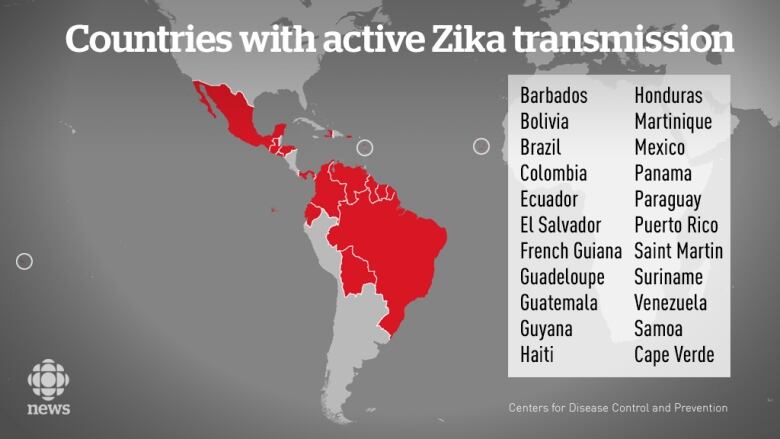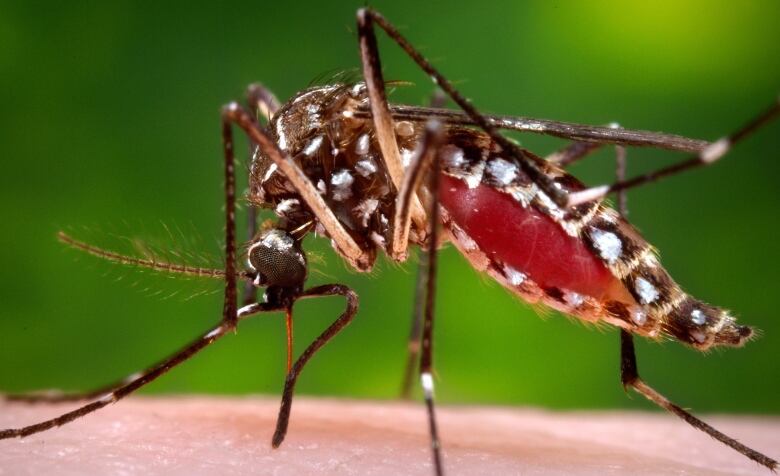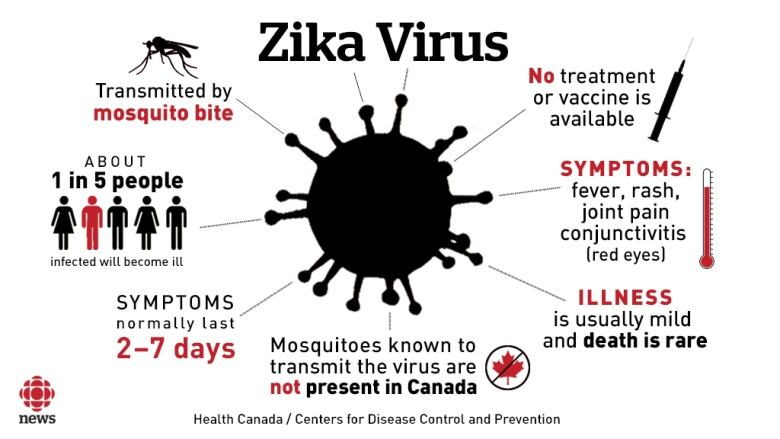Zika virus: What Canadian travellers need to know
'The risk is still considered low,' travel doctor says
Headlines about the Zika virus are alarming people worldwide, and for good reason the virus is linked to microcephaly, which causes babies to be born withunusually small heads.
The World Health Organization said Thursday the virus is "spreading explosively."
- Zika virus outbreak emergency meeting called for Feb. 1, WHO chief says
- Zika virus cases brought back to Canada are few, health officials say
- Pregnant women in Canada, U.S., urged to postpone travel to Zika-hit countries
With all the information out there, it's difficult to assess the risk to Canadians who travel to countries facing an outbreak.
Here's a rundown of what Canadiansshould know.
Whichcountries are affected?
Many countries in South and Central America are affected by the Zika virus, as well as Samoa, in thePacific Islands, and Cape Verde, in Africa.

The worst-hit country is Brazil; the WHOsaid there has been a recent spike in the number of babies there being born with microcephaly.However, the agency cautions that they still don't know for sure if the virus is the cause.
- Brazil 'badly losing' battle to curb mosquito spread of Zika virus: health minister
- 6 things to know about the rapidly spreading Zika virus
Specifically,the northeast region of Brazil is the worsthit, according to the Associated Press. But the second hardest-hit area of the country is the southeast, where Sao Paulo and Rio de Janeiro are located.
Who is at risk?
Travel doctor Mark Wise, who has published two books about travel health, says it's still too difficult to tell how big a risk Zikais because there is not enough information available.
"For the time being, the risk is still considered low," said Wise.
But the people who could be most adversely affected by an infection are pregnant women, women who are thinking of becoming pregnant, or women who could become pregnant.
For the vast majority of people who aren't pregnant or planning on getting pregnant, it's thankfully a fairly mild, self-limited infection.- Dr. Mark Wise, travel doctor
Wise has simple advice for this group:
"It's pretty straightforward: don't go to the countries that are reporting Zika virus," he said.
For the rest of the population, the risk is low.
"It really shouldn't concern the majority of people travelling," said Wise. "Nothing's really changed we just have a third, milder virus," said Wise, citing dengue fever and chikungunya,similarmosquito-borne viruses long found in the region.

If a traveller contracts the virus, it doesn't guaranteethey will develop symptoms or become sick.
"For the vast majority of people who aren't pregnant or planning on getting pregnant, it's thankfully a fairly mild, self-limited infection."
#JanePhilpott says no reason for concern so far about human-to-human transmission here; Cdn officials in close contact with #WHO, #CDC. 2/2
—@CBCAlertsWhat can travellers do?
Pregnant travellers who can't postpone or cancel their trips can take the usual precautions against mosquito bites, like wearing bug spray. The federal government has more information on mosquito-bite prevention here.
Travellers can also wear long sleeves and pants, but that could be uncomfortable in hot weather.
"Cover up, to some extent, during the day. Use insect repellent," Wise advised.
And re-apply insect repellant after being in the water.
"It's a bit of a chore ... but that's the only way to reduce your risk of getting this infection," he said.
Wise adds that these mosquitoes bite during the day, so mosquito netting for beds is not going to helpmuch.

What do you do ifyou contracted the virus?
The WHO says the symptoms are a mild fever, skin rash, conjunctivitis (redness of the eyes), muscle and joint pain, and headaches. Symptoms usually last two to seven days. There's no specific treatment or vaccine.
Wise says travellers should use common sense:"If you feel unwell after a trip to the Caribbean, [or] within a couple of weeks of being to the Caribbean, whether it's a fever, or headache, or a rash, or odd sensations, you should probably seek medical care."
For those who think they have contracted Zikaand are pregnant, or thinking of becoming pregnant, they should seek medical care.Wise says their doctor will likely order a blood test and an ultrasound.
He says women who travelled to countries with the virus should waitabout a month after returning home to attempt to get pregnant.
Link to Guillain-Barr syndrome?
The WHO said there is a possible link between the Zika virus and another condition called Guillain-Barr syndrome, which causes tingling andmuscle weakness that can spread to the respiratory muscles.
But again, Wise says this isn't something travellers need to yet worry about since the risk seemsso low.
He also cautioned against over-reacting to news.
"I wouldn't want the whole world getting paranoid if they sat with their legs crossed and their foot went numb and they thought they had Guillain-Barre syndrome," he said.












_(720p).jpg)


 OFFICIAL HD MUSIC VIDEO.jpg)
.jpg)



























































































